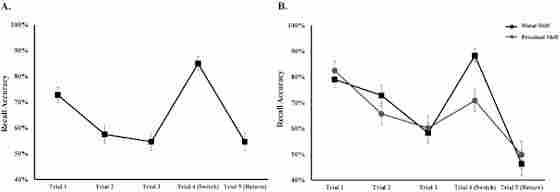Overview
Prior research has consistently demonstrated that word recall decreases over successive trials of similar words (proactive interference). A way to improve subsequent memory is by using words that are semantically different from previous trials or have different meanings. This is thought to overcome the proactive interference seen in semantically similar trials. To further assess this phenomenon, participants in this study completed trials of stimulus words to recall – subsequent trials of words that had different meanings, and then an additional trial of had words with meanings the same as the first trial. The accuracy of these trials was assessed to see if proactive interference was reduced or increased throughout these trials of varied semantics. These research findings show that recall accuracy actually decreased in all trials, demonstrating that proactive interference was maintained.
Figure 2. Results from Experiment 1. (A) Participants received three trials of animal triads then one triad of furniture words. (B) Participants received three trials of fruit triads and then either one profession word triad (distal shift) or one vegetable word triad (proximal shift). Points represent mean recall accuracy, error bars represent 1 SEM.



